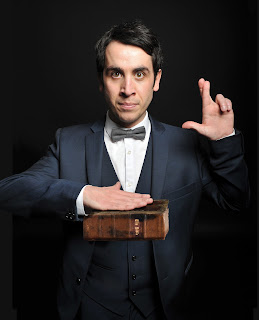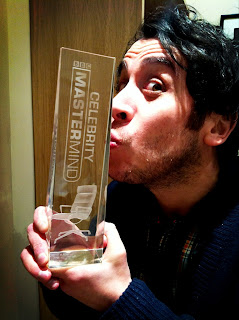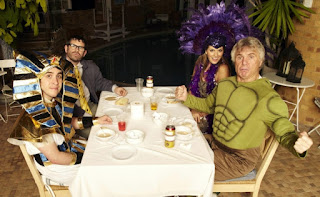 "Glamourous assistants, lions and tigers...I don't think you can do that these days. I think people appreciate the skill behind the magic now"
"Glamourous assistants, lions and tigers...I don't think you can do that these days. I think people appreciate the skill behind the magic now"2013 is set to be Pete Firman's year. After starring on BBC1's The Magicians, Pete has started a brand new tour and is back at the Gatehouse in April after his sell out performance in the MET last year. Hailed as "the new poster boy for British comedy magic" (The Telgraph), Pete's skill for fusing magic and comedy has made him one of the most in demand magicians working on British television. We caught up with Pete to discuss magic, Mastermind and glamorous assistants.
Hi Pete, how’s the tour going so far?
"It's going really well, we're about a dozen shows in so getting into the swing of it. I love being out on the road, it's the best part of the job really".
Can you tell us why the tour is named Hoodwinker? How is this going to differ to last year’s Jiggery Pokery tour?
"There's no massively meaningful reason for the title other than I thought it sounded quite good! I quite like ambiguous show titles and I like interesting words; jiggery pokery just flowed off the tongue nicely and sounds quite curious. I had a show called Flim Flam and another called Hokum so I have a thing for unusal words and picking them for show titles.
It's all new material this year, it's 2012's Edinburgh show, so when I finished the last tour I started working on Hoodwinker. I'm reluctant to say what tricks are in it, I want to keep the surprise! In broad terms there's mind reading, sleight of hand magic, audience participation...lots of new and exciting things and lots of surprises!"
Last year you performed in our MET Studio to 110 people, in April, you will be in the main theatre performing to nearly 600 people. Do you have to tailor your shows depending on the size of the venue?
"Obviously I was mindful of the size of the rooms I'd be playing when putting the show together, but its not a massive consideration actually. For example comedians can play tiny comedy cubs or huge arenas. You just have to make sure that everything you do is going to be really visible"
Why do you think magic and comedy work so well together?
"Traditionally there's a great long line of performers who have combined comedy and magic, from music hall and variety shows and performers like Tommy Cooper, Paul Daniels and Penn and Teller, so the two do go really, really well together. I'm a magician first and foremost, but becasue I started playing comedy clubs I developed this style of working on the jokes as much as the tricks. When you're in venues like that, people haven't come out to see a magic show so you have to match the comedians for laughs. So I got a foot in both worlds and ended up with this hybrid style."
You’ve described performing magic at children’s parties when you were a teenager as “horrible”. What did you hate about it?
"The children! No, I was 15, doing it for pocket money, and my little show would be an opportunity for the mums and dads to go off to the kitchen and drink wine and leave me in a room with kids hyped up on sweets and fizzy pop while I tried to subdue them with balloon animals! Not good times!
I suppose all that stuff in some way shaped me as a performer though. You've got to do a bit of everything to tell the truth."
Have you ever used your magic abilities to your advantage, say to play pranks on friends and family? I wouldn't be able to resist!
"When I was younger and I suppose more precocious I would subject them to loads of magic performances, but as it's become my job I don't really do it in my spare time. At Christmas my Dad will try to encourage me to show my Aunties and Uncles and Grandma some tricks even if I really don't want to!"
Magic has definitely become cool again in the last few years, why do you think this is?
"I think interesting performers have come along, a new generation. It's like that in any profession. Magic is getting a good profile on television again, for a few years it was only late night Channel 4 showing people like David Blaine. I was lucky enough to do The Magicians last year which was a BBC 1, Saturday night prime time platform for magic, so it was about time really."
The tricks seem to have become edgier too?
"I think that's also more to do with the people doing it. Obviously you want the tricks to be unique and fresh, but it's about the performer as much as it's about the trick"
 |
| On The Magicians |
I think now it looks really odd to be sticking swords into scantily clad ladies, I don't think you can get away with it in 2013.
Glamourous assistants, lions and tigers...I don't think you can do that these days. I think people appreciate the skill behind magic too now and don't need all the bells and whistles with a performance."
Are there any magicians out there who have baffled you with a trick that you just can’t figure out?
"When I first got started that feeling is what got me into it really. The longer you're in magic the more you know. For me now it's not about being baffled or fooled, it s about seeing someone doing something interesting in a new way. That's what I get a kick out of"
You studied theatre at university, did you ever plan on a different career within the industry, and did the course help you develop as a performer?
"I wanted to be an actor, so performance training has been useful in the job I ended up doing. The skills are transferrable. In fact I'd like to go back to acting at some point but at the moment I'm a bit busy with the magic! Oscars next year!
Congratulations on winning Celebrity Mastermind! Your specialist subject was Tommy Cooper, would you say he’s had a major influence on your work?
 |
| With his Mastermind trophy |
I felt to do that on Mastermind tied in nicely with what I do and he's so loved in the public consciousness. Although the study was a little like revising for A Levels again! Dates and names and places in my head!.."
Is there anyone else in the industry who inspires you?
"I really like Penn and Teller. They made me look at magic in a different way, I remember watching them when I was younger and thinking they were doing something that was really fresh and different. They're probably over and above anyone else"
Did you have fun on the Come Dine With Me Mash Up on Channel 4? I loved your Tutankhamun costume!
"That wasn't bad was it! I thought that programme was all about the cooking,beacuse my cooking, I thought, was superior! I think some strategic marking went on, I was stitched up! It was loads of fun to do, obviously I'd seen the show before so to do it with some mates and have a laugh seemed a good idea."
Now, you must get lots of offers for glamorous assistants and I would like to make an offer of my own….
"Oh right?"
...My Granddad used to be a magician AND he knows loads of jokes…any chance of taking him on your tour?
"Haha! What's his name?"
"Gordon"
"How old is he?"
"80!"
"And most importantly how does he look in a leotard?"
"Terrifying!"
"Sold! Get him down to the Gatehouse!"
-----------------------------------------------------------------------------------------------------------------------------
Pete Firman will be at The Gatehouse Theatre on April 5th at 8pm.
Interview with Emma Hogan




+to+make+it+in+BritpopCROP.jpg)